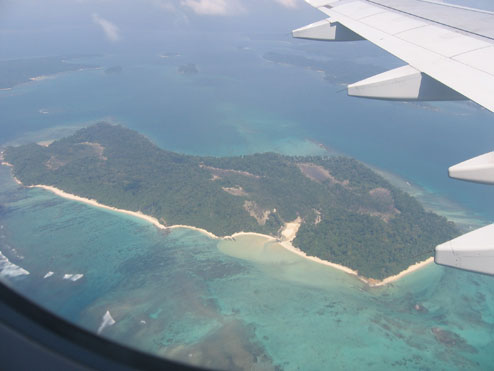Curiously, the Andaman Indians are pleased they were once banished from home

THE A320 swoops down, piercing the blanket of cumulus clouds and revealing a string of emerald baubles set against a copper sulphate patch. Looking out of the window, the sight sends the mind and spirit soaring, and the days ahead stretch out like a grand promise.
To think only a hundred years ago, the Andamans were a forlorn outpost on the far end of oblivion.
The early arrivals were political prisoners, imperial era convicts and refugees from Bengal, mostly East Bengal - certain castes and communities that did not opt to come here, but were ejected from civil society. Nearly all of them arrived by sea.
Their journey most likely was long and tiresome. The same limpid waters must have seemed to them every bit the "kaala paani", coloured by their despair. And as they approached this very emerald coastline, they must have been overwhelmed by fear, apprehension and loneliness. But above all, they must have felt adrift in a sea of misfortune.

"It was a far cry from the paddy fields, ponds full of fish, mango orchards and rows of betel nut trees of our chhere aasa desh (forsaken homeland)," recalls an 87-year-old matriarch. She is flanked by her three sons - a doctor, an advocate and a civil servant. We are sipping tea in the front garden of their colossal newly-built family mansion overlooking the Haddo jetty in Port Blair.
The matriarch tells us how the forest had to be cleared and the land appeased with sweat and toil before it brought forth its bounty. "Young women like us had to trudge through knee-deep mud, mile after mile, braving leeches and tropical rain to fetch drinking water."
We listen, all agog. Struggling to match that Andaman with this one - prosperous, self-sufficient, idyllic, a place where every day seems to be an ethereal combine of dreams and adventure - cruising, surfing, scuba diving, snorkelling...
Piku is a snorkelling guide at Jolly Buoy island, 40 kilometres from Port Blair. The energetic 31-year-old runs a small agency of divers who help you see life - varieties of living corals and fish - in the ocean's womb.
After his day's work, we sit by the expansive Wandoor beach with glasses of beer. Piku's grandparents, it transpires, were convicted for multiple murders in British India and sent here. Piku is "local born", an Andaman Indian, as they are known now. His elder brother is a software engineer in Bangalore and his sister is planning to take a fashion designing course somewhere else.
As in the case of Piku and his siblings, memories of banishment have faded with successive generations of Andaman Indians. Agricultural expansion, government jobs and growth of the tourism and hospitality industry have forged a new identity, an identity to be proud of.

"You can call this little India sans parochialism," says Piku. Over the years, with mingling and inter-caste marriages, old constructs have fallen off the bone.
The older generations that are enjoying the islands' relatively recent prosperity are grateful for the forced exodus all those years ago. The younger generations are also not hankering to integrate with the mainland. In the 1970s, when the West Bengal government's effort to integrate the islands with it was aborted, islanders were only too relieved. Even today they are glad to be away from the agitational politics of the state that might have ruined their prosperity as a Union Territory governed by the Centre.
To the northeast extremity of the islands stands the Cellular Jail - many winged, with matchbox cells and a tower in the middle - a sombre remaining slice of the past in an otherwise recast Andaman. It used to house exiled convicts - mostly young revolutionaries who dared colonial oppression. Now, it is a busy tourist spot.
Every evening, there is a light and sound show. The narrator is the old banyan tree in the compound. The voice, gravelly, belonging to the recently deceased actor Om Puri, tells a plaintive tale: "...I saw it all ...How those young revolutionaries suffered... Now in a free India you won't realise how..."
Indeed.
Prasun Chaudhuri











